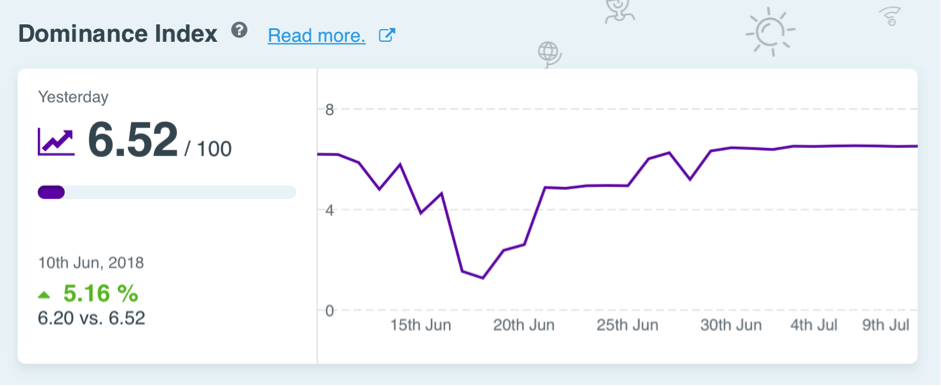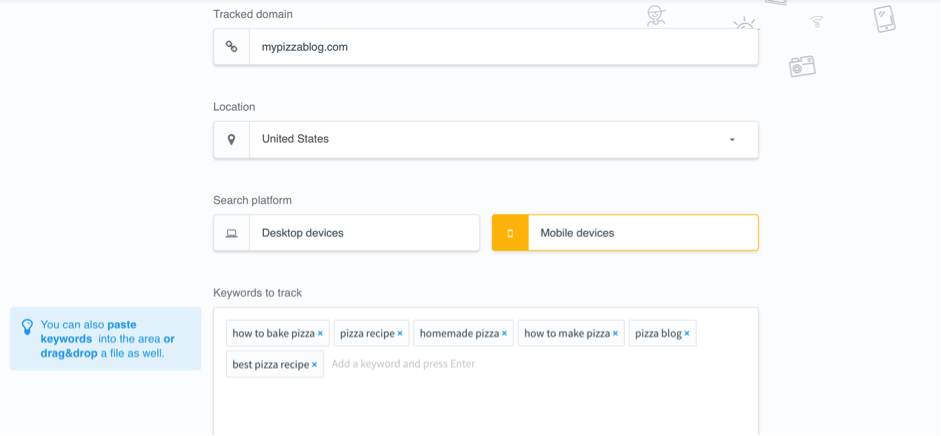The following is a guest post by Maros Kortis. Maros is a full-time digital marketer at Mangools, Digital marketing and SEO have been his passion for more than 4 years. Besides being digital, he’s a musician. You can follow him on Twitter or connect on LinkedIn.
This post isn’t about “SEO is dead” or similar kind of topics that used to be eye-catching. Nevertheless, I’ll discuss a very important part of search engine optimization – rank tracking. Given the mantra, the question could be: Is rank tracking dead? Rank tracking as we used to know it, is dead!![]()
Rank tracking reinvented
Let me bring some light into this. Rank tracking (tracking the organic positions of keywords you optimize your website for) has changed and changes usually make people quit. The bad thing is that quitting and hating at the same time is easier than adapting to fresh trends and learning new stuff. For those who have been in the game for a while, it’s nothing new.
The good thing is that the whole SEO industry, not only keyword position tracking, has come a long way. It has become more advanced. It’s harder and more of a long run than ever before. Many SEO techniques that used to work in the past won’t help anymore. They can kill your SERP rankings instead.
Before you read on - we have various resources that show you exactly how to use social networks to gain massive traffic and leads. For instance, check out the following:
FREE Step-by-Step Twitter Marketing GuideFREE Pinterest Marketing Ebook
Another plus is that there’s more room for SEO specialists who are capable of bringing real value. I think that all the industry news, Google updates and SEO tools that adapt lead to an optimization of a higher quality which eventually means better user experience for the internet users.
 What happened with rank tracking?
What happened with rank tracking?
It’s no longer about ranking first. It’s about analyzing how keyword positions influence organic traffic and its quality in time. What’s behind this change?
- Google SERP changes continually, various people see various results.
- Personalized results push it even more.
- Google changed how local results are pulled so it’s almost impossible to check search results from different locations without using specialized tools, a proxy or VPN.
- Search results are full of features such as featured snippets, ads, answer boxes, carousels and many others.
- Ads are everywhere so for basic internet users it’s complicated to identify what’s a sponsored or organic result and it’s probably not their intention to bother.
- Time-sensitive search results such as breaking news and trending tweets may change throughout a day:
Understand the potential of keywords
The higher the better! This worked in the past. If you successfully started a blog and ranked high for the majority of tracked keywords, you would be satisfied. But what if you knew these keywords don’t generate engaged traffic at all and at the same time you rank #10 or worse for keywords that could bring engaged readers?![]()
The above mentioned should motivate us to do things better. Some SEO specialists may not trust rank trackers anymore. That’s why it’s important to go a bit deeper and track the overall performance of keyword positions.
Rank tracking isn’t dead, but the way you do it might be
There are many decent rank trackers on the market. That’s why I wouldn’t focus on a particular brand. I recommend using tools offering metrics designed for calculating the estimated organic traffic share or visibility coming from tracked keywords and not only their position changes or the number of searches.
Indexes change it all
The metrics are usually transformed to indexes to provide a value that is easy to understand. They also help following historical trends. The indexes are usually related to visibility or niche dominance such as the “Dominance Index” in SERPWatcher or the “Visibility Index” by Sistrix and others.
They basically replace dull and unproductive rank tracking that doesn’t generate any value. What’s more, the indexes provide clear information about how well is our website standing in terms of the organic traffic share. Reaching score 90 out of 100 means you’re a superman, while 1 out of 100 summons you to start working hard.
Hey, before you read on - we have in various FREE in-depth guides on similar topics that you can download. For this post, check out:
FREE workbook: CREATE AWESOME BLOG POSTSFREE Beginner's Guide: START A BLOG
However, scoring 90 in one tool doesn’t mean the same in another. There’s no unified metric. Each rank tracker tool has its own calculations and data sources so it’s always worth reading a couple of reviews or comparisons.
What to look for when choosing your new rank tracking tool:
- Aggregated metrics and indexes calculating the potential organic traffic
- Daily updated keyword positions and metrics
- Historical data and the ability to select various time periods
- Reports where you can see the metrics not only ranks
Keyword research tips that will make rank tracking easier
SEO is based on a combination of various techniques not just link building and keyword ranking. Paying attention to only one or two won’t do the trick. It’s a complex task. When it comes to rank tracking, it’s directly influenced by keyword research.
Doing adequate keyword research is a first step to generate engaged organic traffic. Then you can paste the keywords to a rank tracking tool and start tracking how you rule the niche.
Ranking for related long tail keywords
The era of stuffing high-volume keywords and hoping for the best is gone for good. At least I hope so. As a blogger or small company, you should try to find a profitable niche so your website would pop in search results for a middle or long tail search query. Given the fact around 70% searches are long tails and keyword phrases, there’s some serious power in these long tail keywords and they are well worth investing some time to get better keyword suggestions.
Additionally, ranking for these SEO keyword terms is followed by showing in searches for other related keywords thanks to your website’s relevancy and the number of related long tail search terms. Say thanks to Google RankBrain for this.
So why would you spend years on optimizing for “pizza” if you could go for “how to make pizza”, “how to bake pizza” or “pizza recipe” while ranking for tens or hundreds relevant keywords? Their combined organic traffic potential is higher. Moreover, they are easier to rank for and their conversion potential is way better as they will have better search engine rankings.
Keyword difficulty
Don’t forget to use keyword tools which calculate accurate keyword difficulty so you know how hard is to compete with others optimizing for the same search term. I found a comprehensive comparison of top rated keyword research tools that will provide you with extensive keyword suggestions. Yet again, each tool has its own method of calculating the metric containing different data sources.
What to look for when doing keyword research:
- Middle or long tail keywords instead of one fat head keyword impossible to rank for
- Accurate keyword difficulty score
- SERP analysis, ideally in the keyword research tool
- Basics you find in many SEO guides for beginners
Conclusion
Brace up! It’s time to forget about the old-fashioned rank tracking. I hope these tips will help you to start analyzing data that matters.
You can find out more about SEO rank tracking in the following video:
Are you struggling with your SEO? Do you think you have done so much but somehow your blog traffic from Google search is stagnating? Do you need some help with setting up your blog for SEO? Are you not sure how to build links to your blog?
We have got you covered!
We created a free email course about SEO for your blog – or SEO with a blog. Join today for 4 days and 4 emails and learn about on-page SEO, Google Ranking factors, link building tactics and how to find keywords even you can rank for. Join our (free) email course about Blog SEO today!





